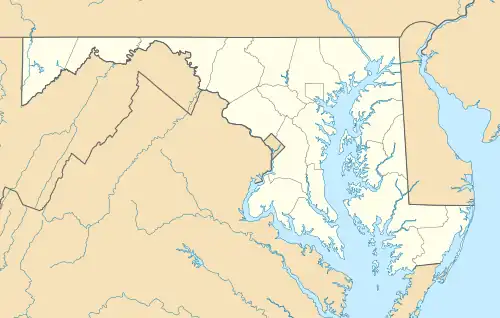Whites Hall
Whites Hall, also referred to as Whiteshall or Whites Hall Farm, is the birthplace and boyhood home of famous Maryland native Johns Hopkins. Whites Hall is located in Gambrills, Maryland.
| Whites Hall | |
|---|---|
.jpg.webp) Drone scan of Whites Hall by Preservation Maryland | |
| Location | 2173 Johns Hopkins Road Gambrills, Maryland 21054 |
| Coordinates | 39°01′15″N 76°40′20″W |
| Area | 13 acres (5.3 ha) |
| Built | 1784 |
| Architectural style(s) | Georgian Architecture |
| Governing body | Private |
 Location of Whites Hall in Maryland  Whites Hall (the United States) | |
History
Whites Hall was originally part of an 1,800-acre land grant to Colonel Jerome White in 1665. The house itself was constructed between 1780 and 1784.[1] The home was designed as a two-story, brick side passage double pile plan dwelling, and was listed on the Maryland Historic Site inventory in 1969.[2]

Johns Hopkins was born at the home on May 19, 1795, to Samuel Hopkins (1759–1814) and Hannah Janney (1774–1864).[3] A family of Quaker beliefs, the Hopkins family enslaved Black people for some years before freeing them in 1807 in accordance with their local Society of Friends decree.[4] Johns Hopkins lived on the property until he reached the age of 17 in 1812, when he left for Baltimore.
The property would remain in the Hopkins family until 1910 when it was sold off for inheritance.[5] Today, the previous manor house is surrounded by residential development and the Walden Golf Club.[5]
Recent history
In 2016, Millersville-based housing developer Polm Companies planned to demolish the historic home for additional space for residential lots.[6][7] Its potential demolition galvanized an effort by preservation and historic activists, who worked with the developer in an effort to save the mansion.[8]
In 2017, the Maryland nonprofit organization, The Johns Hopkins House, Inc., was organized to save and restore Whites Hall.[9] It is recognized as a tax-exempt 501(c)(3) organization by the U.S. Internal Revenue Service.[10] Current fundraising events include weekly outdoor beer gardens from May to October. The Johns Hopkins House, Inc. intends to open the property up to the public. Plans include restoring the Whites Hall manor house and operating it as a country inn/restaurant/tavern, constructing an 18th-century barn on the property for use as a cafe, bakery, wedding reception area and restaurant seating. The large 10-acre field that fronts the house is slated to be developed into an arboretum, bird sanctuary and community park. There are also plans to locate a dozen colonial cottages on the property for overnight stay.
A museum is also slated to be created on the expansive property, intended to explore the complex life of Johns Hopkins, but especially intended to reveal the lives and struggles of the enslaved people who worked the Whites Hall plantation. One of the country's leading authorities on the culture of Chesapeake Bay slavery and, in particular, the variability of the habitations of the enslaved will be overseeing the construction of a representative slave cabin on the Whites Hall property.
The Johns Hopkins House, Inc. will be creating a Scholarship Program to honor the enslaved people of Whites Hall. All excess revenues from the operation of the property will fund annual academic scholarships for African-American students residing in Maryland. Each scholarship will be in the name of a former enslaved person who worked at the Whites Hall plantation. This scholarship program is believed to be the first of its kind in the United States... a direct effort to make reparations for the period of slavery in the U.S., and act as a model for others to follow.
See also
- Clifton, Hopkins's later home in Baltimore
- Linthicum Walks, another historic home in Crofton
References
- "Johns Hopkins' Birthplace In Gambrills On Market For $700K". 15 April 2016. Retrieved 6 January 2018.
- "Maryland Historical Trust" (PDF). mht.maryland.gov. Retrieved 6 January 2018.
- Jacob, Kathryn A. "Mr. Johns Hopkins." Mr. Johns Hopkins. Johns Hopkins University, n.d. Web. 07 Oct. 2013. <http://old.library.jhu.edu/collections/specialcollections/archives/jacob.html Archived 2015-10-17 at the Wayback Machine>.
- Hopkins Thom, Helen (1929), Johns Hopkins: A Silhouette, Baltimore: Johns Hopkins University Press, retrieved 2009-10-04 — the first and only book-length biography on Johns Hopkins. Used as source by Jacob cited above, Findalibrary.
- "Development sprouts around first Johns Hopkins home". 25 February 2014. Retrieved 6 January 2018.
- Yeager, Amanda. "Demolition proposed for Johns Hopkins birthplace". Retrieved 6 January 2018.
- Inc., Donohue Consulting. "Polm Companies Recently Completed Home Communities in Crofton and Severn, Maryland". www.polm.com. Retrieved 6 January 2018.
{{cite web}}:|last=has generic name (help) - Maryland, Preservation (14 April 2016). "Preservation Maryland & Polm Companies Announce Joint Effort to Preserve Whites Hall, Johns Hopkins Boyhood Home". Preservation Maryland. Retrieved 6 January 2018.
- Krol, Melissa Driscoll (August 13, 2018). "Descendant of Whites Hall residents on mission to save Johns Hopkins' birthplace". Capital Gazette. Baltimore Sun Media Group. Retrieved August 1, 2020.
- "The Johns Hopkins House, Inc. Given Tax-Exempt Status by the IRS". The Johns Hopkins House, Inc. April 17, 2018. Retrieved August 1, 2020.